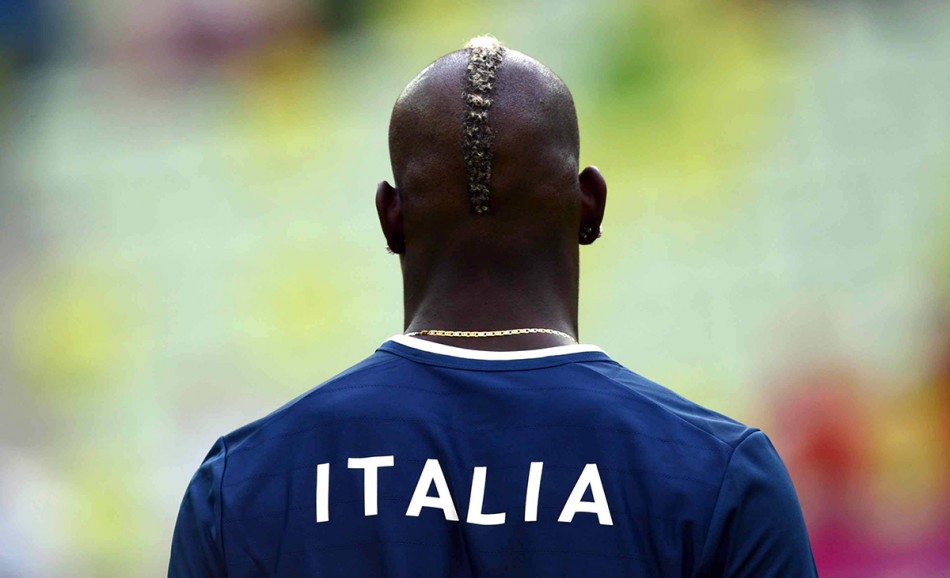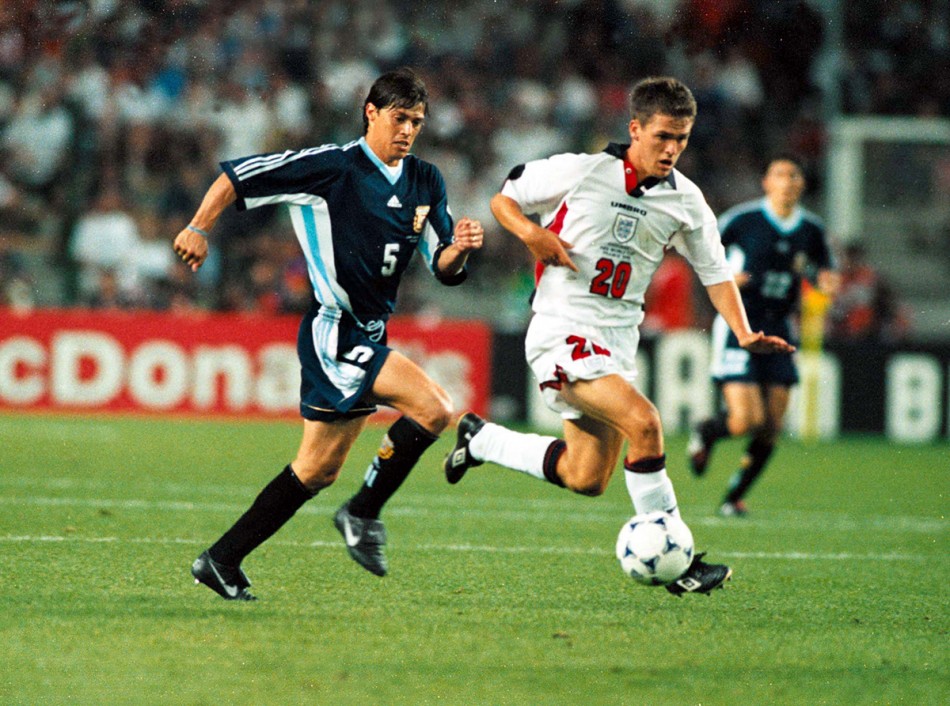In August 1990, just weeks after Totò Schillaci’s exploits at that summer’s World Cup, a shared place of birth would have seemed the only connection between the newborn Mario Balotelli and Italy’s Golden Boot winner. Born in Palermo to two Ghanaian immigrants, Thomas and Rose Barwuah, young Mario had a difficult first few years, undergoing a series of intestinal operations as a toddler. Even after being placed in foster care with the Balotelli family in the northern town of Brescia, the idea that Mario would one day wear the blue of Italy, let alone become a national icon, would have seemed unthinkable.
Fast-forward to this summer and Mario Balotelli’s two-goal demolition of Germany in the semi-final of Euro 2012 cemented his fame and sealed his reputation as an explosive yet unpredictable talent. While a highly welcome addition to the Italian national team, his success is especially significant in a country that has often struggled with the concept of national identity as it attempts to reconcile its mixed feelings towards immigration.
Despite its epic history, modern Italy is a young country created from the merging of strictly autonomous regions, and today remains fiercely regional. During both world wars this phenomenon infamously hampered communication between “Italian” soldiers, and it is often stated that the existence of a common language in Italy is the sole result of the development of a state-run national network of television and radio.
For most of the twentieth century Italy was one of the great emigrating nations: between 1876 and 1976 the Italian diaspora numbered over 25 million. During this period the issue of immigration was essentially non-existent. Immigrants did not begin arriving in Italy until the 1960s, and only in the 1980s did their numbers start to multiply. Italy’s unique geographical position has made it a natural port-of-call for those arriving by sea from both Eastern Europe and North Africa. Today Romanians, Albanians and Moroccans make up the bulk of Italy’s legal immigrant population, which currently stands at over 4.5 million, a figure that has tripled since 2003.
The progress of the immigrant experience in Italy has suffered due to government indecision and indifference, as well as general bureaucracy. This combined with a cautious mixture of stereotyping and skepticism have naturally hindered integration and acceptance, while one-sided reporting often only perpetuates the problem. Balotelli himself has frequently been subjected to racial abuse by opposing fans, both in Italy and during Euro 2012. While many Italians recognize the complexities of the situation, many immigrants still find themselves socially marginalized. Yet statistics suggest that those who persevere are ultimately rewarded.
Indeed, Balotelli’s arrival on a global stage comes at a time when Italy finds itself at a turning point in its immigration history. As the children of the first wave of immigrants become adults, so a seismic shift in attitude is forced upon Italian society. Few Italian classrooms are without the son or daughter of an immigrant these days, a fact that can only have a positive long-term bearing on the way the matter is accepted.
The impact of Balotelli’s success with the national team is not lost on coach Cesare Prandelli. Shortly after taking control of the Azzurri he introduced a “code of ethics”, ensuring players representing their country maintained responsible conduct both on and off the pitch. The forward’s eccentric behavior has challenged this code on more than one occasion, yet Prandelli’s faith in the young talent is now being rewarded, and not only in a sporting sense.
Though he is the first black player to score for Italy (against Poland in November 2011) Balotelli is not the first player of African origin to pull on the famous Azzurri shirt. That distinction belongs to former midfielder Fabio Liverani, who was born in Rome to an Italian father and Somali mother. Yet after making his Italy debut in 2001 Liverani represented his country just twice more over the next five years, and despite enjoying a moderately successful Serie A career never became a household name. Likewise Algerian-born defender Matteo Ferrari (whose mother came from Guinea) made eleven appearances for Italy between 2002 and 2004 yet was not an international regular.
Other black athletes have represented Italy in other sports, but only after switching nationality. American-born long-jumper Andrew Howe changed allegiance after his mother’s marriage to an Italian. Similarly another long-jumper, Fiona May, was born in Britain to Jamaican parents, but enjoyed success with Italy after marrying pole-vaulter Gianni Iapichino. Following her retirement she moved into acting, and even starred in Butta la luna, a television drama series that tackled the issues of racism and social integration.
The subject of Italian identity and the national team is not a recent one. Until the 1960s the Italian national team was regularly graced by the presence of so-called oriundi, or nationalized Italians, often arriving from South America. Despite this long tradition, some still oppose the inclusion of such players, a sentiment perhaps fueled by Mauro German Camoranesi’s confession to feeling more Argentine than Italian after lifting the World Cup for Italy in 2006. Prandelli however has embraced the problem, openly welcoming several oriundi into the national fold such as Thiago Motta and Pablo Osvaldo.
But the oriundo situation is different to Balotelli’s, as these players are born with an existing connection to Italy through parents or ancestry. The French, English and Dutch national teams began featuring the sons of immigrants in the 1970s, yet these too were mostly players whose parents had arrived from former colonies. Even Germany’s current multi-ethnic squad cannot boast a player whose chances were as stacked against him as SuperMario.
What makes Balotelli’s case a rarity is that neither of his parents were born in Italy, nor grew up there, nor came from a country that had any significant historical ties to Italy, which is what makes the young Italian striker’s story all the more extraordinary and encouraging. Naturally, his parents’ nationality gave him the right to play for Ghana, but Mario instead opted for Italy, finally becoming eligible after earning his Italian citizenship upon turning eighteen. For Balotelli it wasn’t even a decision to make. Born and raised in Italy, he feels Italian simply because he is — after all, he knows nothing else.
Balotelli represents a new example of the immigrant experience in Italy. He finds himself the most high-profile of an increasing band of Italian-born players of African origin for whom the national obsession — football — is proving a medium with which to successfully integrate themselves (and thousands others) into the country’s consciousness. Torino defender Angelo Ogbonna (whose parents emigrated from Nigeria) was an unused substitute at Euro 2012, while Milan’s teenage forward Stephan El Shaarawy (whose father is Egyptian) looks set to form an unprecedented partnership with Balotelli at international level. That the pair have only one Italian parent between them can only aid the cause of numerous other Italians of African origin currently plying their trade in Italy’s lower leagues, further from the media’s glare.
Incidents of racism in Italian football often cause casual observers to misbrand the sport and its followers. Yet while the stadium is often sadly an outlet for racism, the sport itself cannot be held to blame. On the contrary, young Italians of have discovered that the democracy of the football pitch has provided them with the structure from which to build a positive future and possibly a career. What their stories repeatedly demonstrate, is that when it comes to acceptance, social integration and community, football is actually several years ahead of the rest of society.

